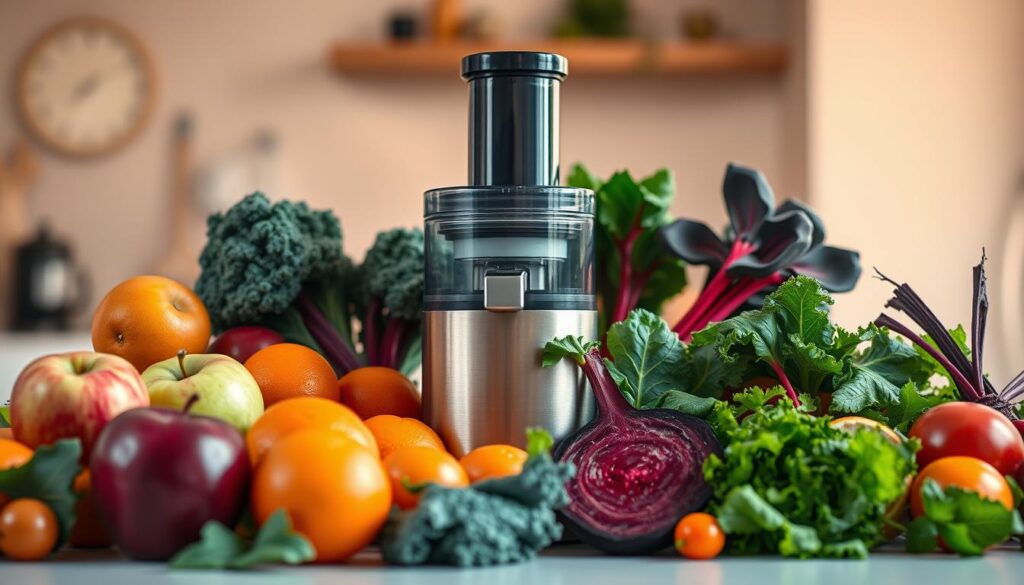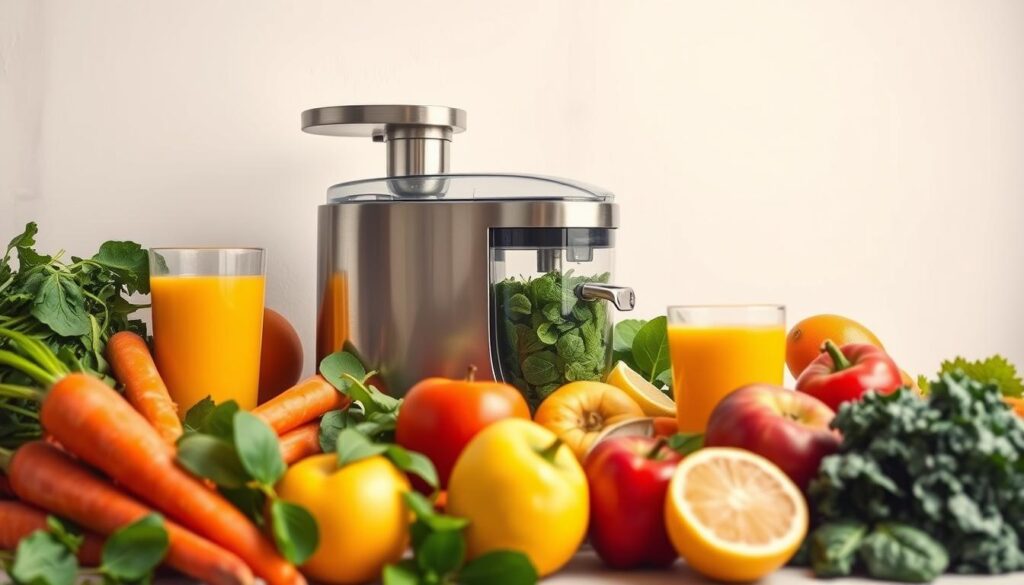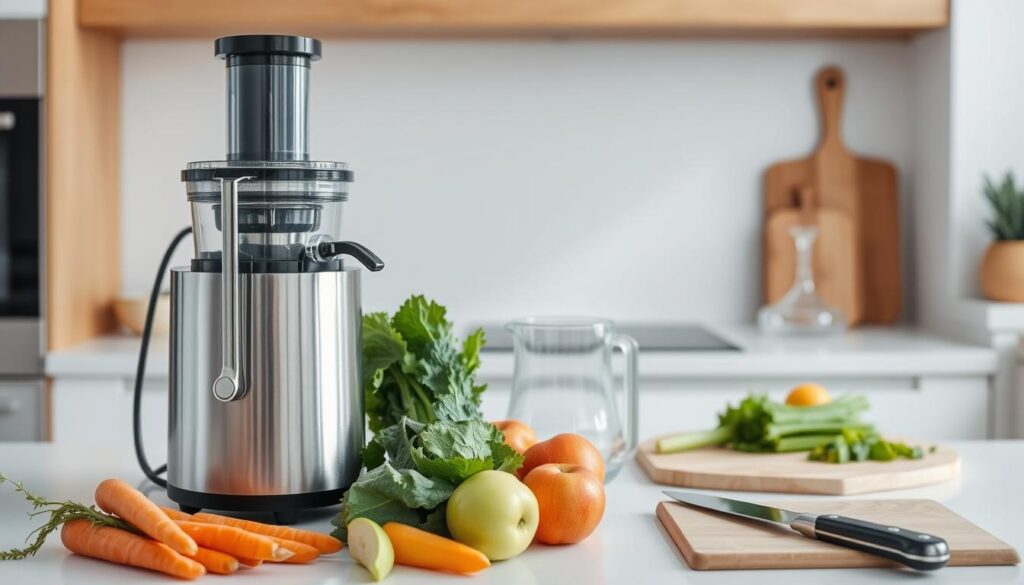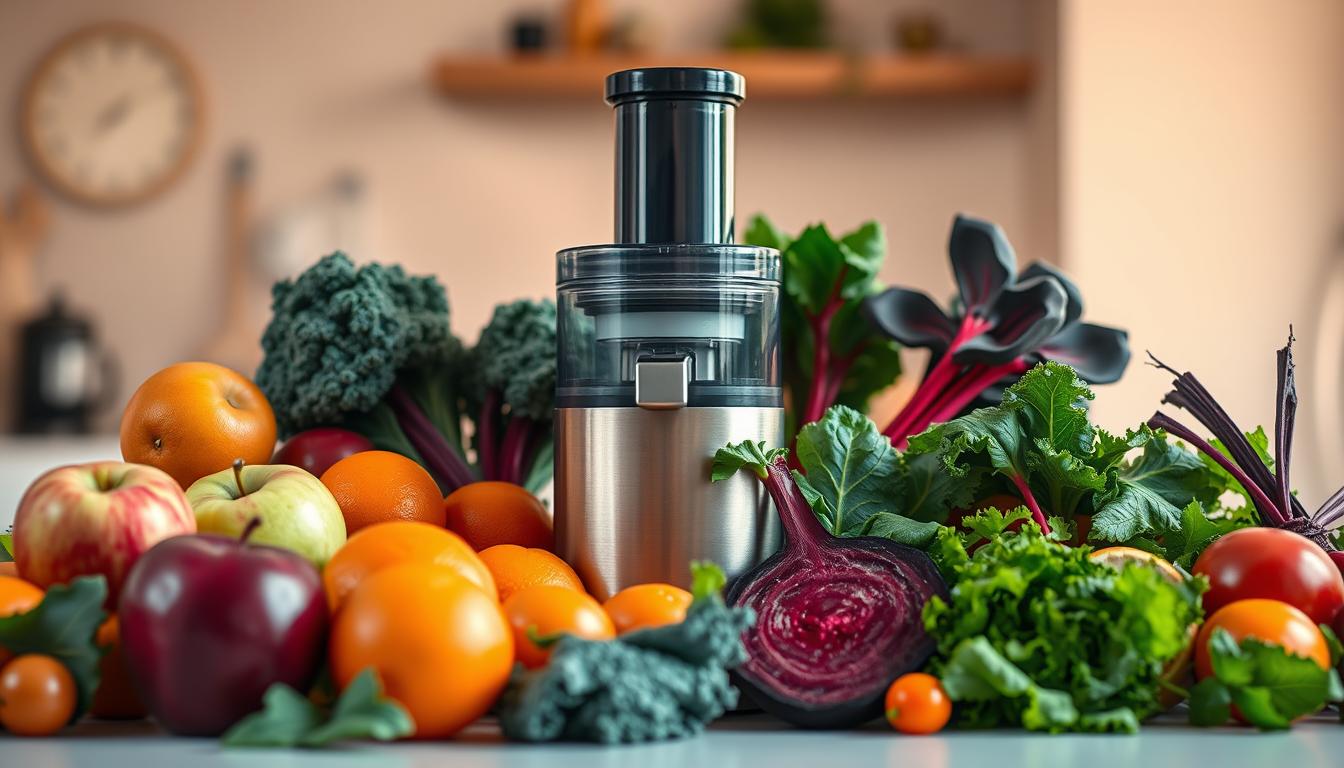
Are you tired of diets that promise the world but fail to deliver? Juicing might be the answer you’ve been looking for. It has become a key weight loss strategy, helping people regain their health.
Best juicer juice recipes are more than just mixing fruits and veggies. They create a nutritional powerhouse that aids in weight management. By extracting nutrients from fresh produce, these recipes offer a tasty way to boost health and energy.
Imagine sipping on a juice that not only tastes amazing but also boosts your metabolism and supports weight loss. With the right recipes, making this dream a reality is possible.
Key Takeaways
- Juicing offers a nutrient-dense approach to weight management
- Best juicer juice recipes focus on 80% vegetables and 20% fruits
- Fresh juices can provide essential micronutrients and support cardiovascular health
- Juicing complements a balanced diet and healthy lifestyle
- Proper juice preparation maximizes nutritional benefits
Table of Contents
Understanding Juicing Benefits for Weight Management

Discovering the power of juice recipes can change your weight loss journey. Healthy juice recipes are more than a refreshing drink. They are packed with nutrients that support your fitness goals. Learning how juicing works can be a powerful tool for managing weight.
What Makes Juicing Effective for Weight Loss
Juicing can be a game-changer for weight loss for several reasons:
- Creates a calorie deficit with low-calorie nutrient-dense drinks
- Provides essential vitamins and minerals in concentrated form
- Helps control hunger and reduce cravings
- Supports metabolism and hydration
Key Nutrients in Fresh Juices
Your body gets maximum nutrition from well-made juice recipes. Nutrient density is key for successful weight management.
| Nutrient | Benefits | Calorie Content |
|---|---|---|
| Leafy Greens | High in Vitamins A, C, K, Iron, Calcium | 35-50 calories per serving |
| Citrus Fruits | Boosts Metabolism, Provides Vitamin C | 60-90 calories per serving |
| Ginger | Supports Digestion, Reduces Inflammation | 10-20 calories per serving |
Role of Juicing in a Balanced Diet
Juice recipes can help with weight loss but should not replace a balanced diet. Experts suggest 1-2 glasses of green juice daily for the best results without too many calories. Remember, juicing is a supplement to healthy eating, not a complete meal.
Juicing provides a convenient way to consume multiple servings of fruits and vegetables in a single drink.
Essential Equipment and Preparation Tips

Starting with easy juice recipes means you need the right tools and knowledge. Picking the perfect juicer is key to making tasty and healthy drinks. Each juicer type has its own benefits for your juicing journey.
When choosing a juicer for your best juicer juice recipes, consider these factors:
- Centrifugal Juicers: Fast and affordable, great for beginners
- Cold Press Juicers: Slow extraction keeps more nutrients
- Vertical Juicers: Space-saving for small kitchens
- Horizontal Juicers: Versatile for various food tasks
Getting ready for juicing is important for quality. Clean all fruits and veggies well and take out any bad spots. Tip: Choose organic to avoid pesticides and chemicals.
Here are some tips to make juicing quicker:
- Prepare ingredients ahead of time
- Use seasonal fruits and veggies for better taste
- Get a sharp cutting board and knife
- Keep juice in airtight containers
Remember, fresh is best when making easy juice recipes. Drink your juice within 24 hours for the most nutrients. Cold press juicers, like the Nama J2, help keep juice fresh longer.
Pro tip: Add a squeeze of lemon to prevent oxidation and keep your juice’s color and nutrients bright!
Best Juicer Juice Recipes for Beginners
Diving into juicing can change your nutrition and wellness journey. With just a few simple ingredients, you can make delicious juices. These juices are packed with nutrients and are great for beginners.
Most Americans don’t eat enough fruits and veggies. Only 9% meet the daily intake. Juicing is a simple way to fill this nutritional gap. Let’s look at three easy juice recipes to start your wellness journey.
Green Detox Blend
Your juicing journey begins with this green juice. Here’s what you need:
- 1 handful spinach leaves
- ½ green apple
- ½ inch fresh ginger
- ¼ peeled lemon
- Water as needed
Pro tip: This green detox blend follows the 80/20 rule. It uses mostly veggies for stable blood sugar. It’s a powerful cleanse that gives you essential nutrients.
Citrus Energy Boost
Need a natural energy boost? This citrus juice is your answer. It’s full of vitamin C and natural sugars. It gives you energy without artificial stimulants.
- 1 orange
- 1 lemon
- 2-inch piece of ginger
- ½ cup coconut water
Berry Metabolism Booster
This berry juice is your weight loss friend. It boosts metabolism and tastes great. It’s a tasty way to get more nutrients.
- 1 cup mixed berries
- ½ green apple
- Small piece of ginger
- Handful of spinach
Remember, juicing is a great way to eat more fruits and veggies. These recipes are just the start of your nutritional journey!
Power-Packed Vegetable Juice Combinations
Vegetable juice recipes are a game-changer for your weight loss journey. They offer a powerful nutritional punch and help you lose weight. By choosing the right vegetables, you can make tasty, low-calorie drinks that support your fitness goals.
Let’s explore some nutrient-dense vegetable juice combinations that can transform your diet:
- Six-vegetable juice (66 calories per serving)
- Tomato-vegetable juice (46 calories per serving)
- Celery juice (65 calories per serving)
- Savory kale-tomato juice (82 calories per serving)
- Homemade V8 juice (75 calories per serving)
Your juice recipes can include a variety of vegetables that boost metabolism and support weight loss. Nutrient-rich ingredients like beets, carrots, and leafy greens offer maximum health benefits.
| Vegetable Combination | Calories | Key Benefits |
|---|---|---|
| Celery-Cucumber-Lemon | 42 | Hydration, Detox |
| Kale-Spinach-Carrot | 55 | Nutrient Density |
| Beetroot-Carrot-Apple | 75 | Energy Boost |
When creating your juice recipes, focus on balanced combinations that provide essential nutrients without excessive calories. Remember that vegetable juices should complement a balanced diet, not replace entire meals.
Nutrient-Rich Fruit Juice Blends
Fruit juices can help with weight loss if made right. It’s important to know how fruits affect your health and metabolism. Here are some tasty and healthy fruit juice blends that can help you reach your wellness goals.
Tropical Weight Loss Mix
Try a tropical mix that’s tasty and helps with weight management. A mix of grapefruit and watermelon is a low-calorie, refreshing choice. These fruits boost your metabolism:
- Grapefruit: Just 127 calories per serving
- Watermelon: Only 107 calories per serving
- Rich in hydrating nutrients
- Supports natural fat-burning processes
Antioxidant-Rich Berry Combinations
Berries are packed with nutrients that can make your juice better. Strawberry-apple juice tastes great and has lots of antioxidants. This mix gives you:
- 245 calories per serving
- High vitamin C content
- Supports immune system
- Helps reduce inflammation
Low-Sugar Fruit Options
If you’re watching your sugar intake, try these low-calorie options:
- Kiwi agua fresca: Only 43 calories
- Mango-pineapple juice: A tropical treat at 233 calories
- Focus on portion control
- Mix with low-sugar vegetables
“The key to successful juicing is balance and variety” – Nutrition Expert
While these juices are tasty, they should not replace whole foods. The goal is to boost your nutrition, not to eat less.
Morning Energy Juice Recipes
Start your day with juices that give you natural energy. They don’t need caffeine or added sugars. These recipes help boost your metabolism, improve focus, and aid in weight loss.
Choose ingredients that are packed with nutrients for your morning juices. The right mix of fruits and veggies can make your breakfast better. It gives you energy all morning.
- Breakfast Zinger Juice (158 calories)
- Sweet Potato Carrot Spiced Juice (318 calories)
- Morning Green Juice (130 calories)
- Beet-Carrot-Apple Juice (153 calories)
- Lemon Ginger Green Juice (63 calories)
Your morning juice can help you eat more fruits and veggies. Research from the Cleveland Clinic shows that fiber in juices keeps you full longer. This is key for staying in a calorie deficit.
Pro tip: Pick ingredients that taste good and are good for you for your morning juicing recipes.
Adding these energizing juices to your morning can make your day better. It’s a tasty way to improve your health and help with weight loss.
Weight Loss Friendly Green Juice Recipes
Green juice recipes can be great for losing weight. They are full of vitamins, minerals, and antioxidants. These help boost your metabolism and health. By picking the right ingredients, you can make tasty juices that aid in weight loss.
When making juice, choose low-calorie, nutrient-rich ingredients. Studies show that juices with more veggies can keep sugar levels down. This is better than juices with lots of fruit.
Spinach and Kale Power Blend
This juice uses spinach and kale, two super greens. Here’s a simple recipe to help you lose weight:
- 2 cups fresh spinach
- 1 cup kale leaves
- 1 green apple
- 1/2 cucumber
- 1/2 lemon
- Small piece of ginger
Cucumber-Based Detox Drinks
Cucumber juices are great for staying hydrated and detoxing. They have only 65 calories per serving. They help remove toxins and aid in weight management.
- 2 cucumbers
- 1 celery stalk
- 1/2 green apple
- Handful of parsley
- Squeeze of lemon
Celery-Focused Combinations
Celery juice recipes are good for losing weight. With just 65 calories per serving, they offer important nutrients. They also help boost your metabolism.
- 4-5 celery stalks
- 1 green apple
- 1/2 cucumber
- Small piece of ginger
- Handful of spinach
These juice recipes are best when part of a balanced diet. They should add to your meals, not replace them. Always pick organic produce to avoid pesticides and get more nutrients.
Metabolism-Boosting Juice Combinations
Looking for the best juicer juice recipes to boost your metabolism? Some ingredients are super effective. Start your journey to better metabolic health with juices that help with weight loss and boost energy.
Key ingredients for metabolism-boosting juicing recipes include:
- Ginger – natural metabolism accelerator
- Lemon – aids digestion and fat breakdown
- Cayenne pepper – increases calorie burning
- Green tea – supports metabolic rate
Creating effective juicing recipes means knowing how ingredients work together. Ginger, for example, has compounds that boost thermogenesis. This helps your body burn calories better.
| Ingredient | Metabolic Benefit | Calories per Serving |
|---|---|---|
| Ginger | Metabolism Booster | 20 |
| Lemon | Digestion Support | 10 |
| Cayenne Pepper | Calorie Burning | 5 |
| Green Apple | Blood Sugar Regulation | 30 |
Remember, juicing should be part of a balanced diet and regular exercise. Your metabolism-boosting juice recipes will work best as part of a whole approach to nutrition and fitness.
Pro tip: Aim for juice combinations with at least 70% vegetables to maintain optimal nutritional balance.
Strategic Timing for Juice Consumption
Learning when to drink juice can really help with weight loss and getting more nutrients. Drinking your juice at the right time can help your body absorb nutrients better. This can also help you reach your fitness goals.
When you make your easy juice recipes, keep these timing tips in mind:
- Drink fresh juice on an empty stomach for better nutrient absorption
- Wait 20 minutes after drinking juice before eating a meal
- Don’t drink too much juice to avoid too much sugar
Best Times to Drink Juices
You can drink juice at different times of the day. Morning juices can start your metabolism. Afternoon juices can give you a boost of energy.
| Time of Day | Juice Recommendation | Benefit |
|---|---|---|
| Morning | Green Detox Juice | Metabolism Boost |
| Mid-Morning | Citrus Energy Blend | Energy Enhancement |
| Afternoon | Berry Metabolism Juice | Hunger Control |
Pre and Post Workout Options
Choose juices that help with your workout and recovery. Pre-workout juices should give you quick energy. Post-workout juices help with muscle recovery.
“The right juice at the right time can transform your fitness journey.” – Nutrition Expert
- Pre-Workout: Pick juices with natural sugars for quick energy
- Post-Workout: Choose juices full of antioxidants for recovery
Remember, the secret to good juicing is balance and timing. Add these nice juice recipes to your daily routine for better health and weight control.
Common Juicing Mistakes to Avoid
Many people make mistakes when they start juicing. These errors can hurt their weight loss and nutrition plans. Knowing these common mistakes can help you get the most out of your juices.
Some common juicing mistakes include:
- Overloading with fruit juices high in sugar
- Neglecting fiber intake
- Ignoring protein and healthy fat balance
- Using improper juicing techniques
Your juicing journey should aim for balanced, nutrient-rich drinks. Centrifugal juicers produce juice that should be consumed within 12-24 hours due to rapid oxidation. So, timing and preparation are key. When making your juice recipes, keep these tips in mind:
- Prioritize vegetable-based juices over fruit-heavy blends
- Incorporate protein sources alongside your juices
- Minimize food waste by using pulp in other recipes
- Clean your juicer immediately after use
Be careful with certain ingredients in your juices. For example, using 100% beet juice can lead to digestive issues. So, use it in moderation. Also, store your juices in glass containers and drink them fast to keep them nutritious.
Remember, juicing is a supplement to a balanced diet, not a quick fix. By avoiding these mistakes, you’ll make better and more enjoyable juices. These juices will help support your health and weight loss goals.
Storage and Preparation Guidelines
Creating the best juicer juice recipes means knowing how to store them right. Fresh juices are delicate and need careful handling. This keeps their health benefits strong.
Your juicing recipes need the best storage methods to keep their nutritional value high. Let’s look at the top ways to store your freshly made juices.
Optimal Storage Techniques
To keep your juices fresh, follow these key storage tips:
- Use airtight glass containers for storage
- Store juices at 35-40°F (1.6-4.4°C)
- Drink within 24-48 hours for best nutrition
- Fill containers to the top to reduce oxygen
Maintaining Nutritional Value
Fresh juices are most nutritious when drunk quickly. Cold-pressed juices can last up to 5-7 days when vacuum sealed. But for the best nutrition, drink your juice as soon as you can.
“The fresher the juice, the more nutrients you’ll receive” – Nutrition Experts
Freezing and Long-Term Storage
Freezing is great for making juicing recipes ahead of time. Here’s how to freeze juice for 2-3 months:
- Use small glass containers or silicone ice trays
- Leave minimal air space when freezing
- Add a splash of lemon juice to prevent oxidation
- Thaw in the refrigerator before drinking
By using these storage tips, your juicer juice recipes will stay nutritious and tasty.
Conclusion
Your journey to better health doesn’t stop with juicing. But, it can be a great tool in your health plan. Healthy juice recipes add flavor and nutrients to your diet. They help you reach your wellness goals.
For lasting weight loss, mix juicing with eating well and staying active. Try different juices with ingredients like leafy greens and cucumber. But, don’t forget to eat whole fruits and veggies too.
Drink 4-8 ounces of fresh juice each day. This should be part of a bigger plan for healthy eating.
Juicing can be a fun way to help with weight loss. Choose organic ingredients and try new mixes. Listen to how your body reacts. A doctor can help make a juicing plan that fits your health goals.
Keep going, even when it’s hard. See these juice recipes as a fun part of your health journey. Drinking nutrient-rich juices can really help you meet your health goals.

